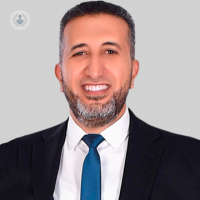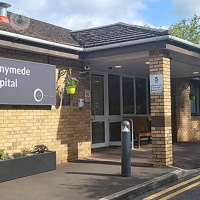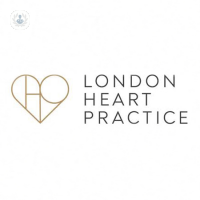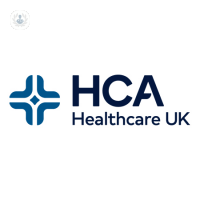What is atrial fibrillation ablation?
Atrial fibrillation ablation is a procedure used to treat atrial fibrillation - a type of abnormal heart rhythm also known arrhythmia. It works by scarring the inside of the heart, by burning or freezing parts of the heart tissue, to help alter or break up electrical signals that cause irregular heartbeats.
There are a group of cells in the heart that start the signal which initiates a heartbeat. In people who have atrial fibrillation these cells are overridden by other cells that are faulty and work too fast, causing the upper chambers of the heart to fibrillate (quiver). This creates a disorganisation of contractions in the heart and means that blood may not be pumped around the body efficiently.

Why is it done?
Some people experience shortness of breath and palpitations. In addition, atrial fibrillation can increase the risk of stroke.
Some people take medicine to control the symptoms, whilst for others the medication is ineffective so an ablation is needed to control it.
If your atrial fibrillation attacks are short (less than 7 days long), then it’s likely that an ablation will help in the long-term. If it’s very persistent, then ablation is less likely to work in the long-term. If you have no other heart problems, then this procedure might be a good option for you.
How is the procedure performed?
The procedure is normally performed in a hospital and you’ll be given a sedative to help you relax. The procedure may be performed under general anaesthetic. A doctor will insert a needle into your vein and place a tube through the needle. After this, catheters are thread through the tube and guided to various places within your heart. These catheters have electrodes at the tips which send electrical impulses to your heart. Either heat or cold is applied via these catheters to the desired area to destroy cells and cause scarring.
The whole procedure can take up to 6 hours. Dye can be used to help the doctor see the blood vessels better. Sometimes, ablation can cause discomfort and slight pain. The procedure would be stopped if the pain is severe or it is too uncomfortable.
How do you prepare for it?
Your doctor will offer advice to you about how to prepare for it. Usually, you are asked to stop eating and drinking the night before the procedure.
You will be advised what medications should be stopped on the day of the procedure. If you are not on a blood thinning tablet normally, you may be asked to take it for a few weeks before and after the procedure.
If you have any other heart conditions or an implanted heart device such as a pacemaker, your doctor will need to advise you on any precautions to take before.
After-care
After the procedure you will need to rest a few hours and your heartbeat and blood pressure will be monitored. You may be able to go home the same day but will likely need a few days of rest before resuming normal activities.
After receiving this treatment, your symptoms should subside and you’ll start feeling better. However, your irregular heartbeat can return years later. This is more common in elderly people.
You’ll likely return to see the doctor after three months to check if the symptoms have reappeared. If they have, you should be able to control the symptoms with medication. If you need another procedure, then it’s advised that you wait until you’ve completely healed before having another one.
You doctor could also suggest that you have a pacemaker fitted if your symptoms keep returning.
09-05-2019 11-16-2023Atrial fibrillation ablation
Dr Mokhtar Ibrahim - Cardiology
Created on: 09-05-2019
Updated on: 11-16-2023
Edited by: Aoife Maguire
What is atrial fibrillation ablation?
Atrial fibrillation ablation is a procedure used to treat atrial fibrillation - a type of abnormal heart rhythm also known arrhythmia. It works by scarring the inside of the heart, by burning or freezing parts of the heart tissue, to help alter or break up electrical signals that cause irregular heartbeats.
There are a group of cells in the heart that start the signal which initiates a heartbeat. In people who have atrial fibrillation these cells are overridden by other cells that are faulty and work too fast, causing the upper chambers of the heart to fibrillate (quiver). This creates a disorganisation of contractions in the heart and means that blood may not be pumped around the body efficiently.

Why is it done?
Some people experience shortness of breath and palpitations. In addition, atrial fibrillation can increase the risk of stroke.
Some people take medicine to control the symptoms, whilst for others the medication is ineffective so an ablation is needed to control it.
If your atrial fibrillation attacks are short (less than 7 days long), then it’s likely that an ablation will help in the long-term. If it’s very persistent, then ablation is less likely to work in the long-term. If you have no other heart problems, then this procedure might be a good option for you.
How is the procedure performed?
The procedure is normally performed in a hospital and you’ll be given a sedative to help you relax. The procedure may be performed under general anaesthetic. A doctor will insert a needle into your vein and place a tube through the needle. After this, catheters are thread through the tube and guided to various places within your heart. These catheters have electrodes at the tips which send electrical impulses to your heart. Either heat or cold is applied via these catheters to the desired area to destroy cells and cause scarring.
The whole procedure can take up to 6 hours. Dye can be used to help the doctor see the blood vessels better. Sometimes, ablation can cause discomfort and slight pain. The procedure would be stopped if the pain is severe or it is too uncomfortable.
How do you prepare for it?
Your doctor will offer advice to you about how to prepare for it. Usually, you are asked to stop eating and drinking the night before the procedure.
You will be advised what medications should be stopped on the day of the procedure. If you are not on a blood thinning tablet normally, you may be asked to take it for a few weeks before and after the procedure.
If you have any other heart conditions or an implanted heart device such as a pacemaker, your doctor will need to advise you on any precautions to take before.
After-care
After the procedure you will need to rest a few hours and your heartbeat and blood pressure will be monitored. You may be able to go home the same day but will likely need a few days of rest before resuming normal activities.
After receiving this treatment, your symptoms should subside and you’ll start feeling better. However, your irregular heartbeat can return years later. This is more common in elderly people.
You’ll likely return to see the doctor after three months to check if the symptoms have reappeared. If they have, you should be able to control the symptoms with medication. If you need another procedure, then it’s advised that you wait until you’ve completely healed before having another one.
You doctor could also suggest that you have a pacemaker fitted if your symptoms keep returning.
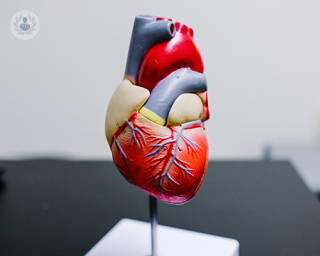

When the first ablation fails: Arrhythmia after atrial (heart) ablation
By Professor Mark Gallagher
2025-01-18
If you experience arrhythmia, a doctor may recommend atrial ablation to burn and destroy the abnormal area of heart tissue that is causing the arrhythmia. While ablation will generally restore your normal heart rhythm, it is important to remember that arrhythmia may still occur after the procedure, in some cases. Here to provide a detailed insight into arrhythmia after atrial ablation, including causes, prevention and treatment, is esteemed cardiologist, Dr Mark Gallagher. See more
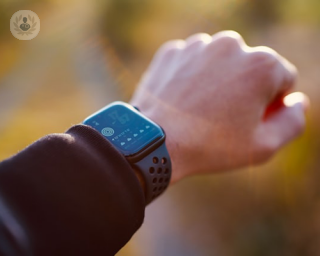

Can your smart watch detect atrial fibrillation?
By Dr Fu Siong Ng
2025-01-18
Atrial fibrillation is the most common heart rhythm disorder, whereby an irregular heartbeat can lead to breathlessness, palpitations and fatigue. Unfortunately, the condition puts patients at higher risk of blood clots and strokes, so careful management is required. To give an all-you-need-to-know guide to atrial fibrillation, renowned consultant cardiologist Dr Fu Siong Ng offers expert insight on diagnosis and treatment of the condition, as well as discussing how the condition can be prevented. See more
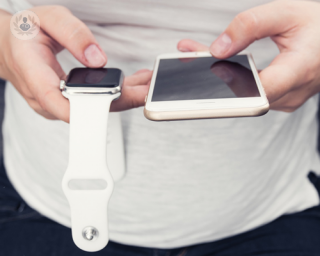

Screen for AF with your smartwatch or smartphone
By Professor Dhiraj Gupta
2025-01-18
Researchers have recognised smartphone and smartwatches' potential for pinpointing possibly live-saving information which can assist in diagnosing atrial fibrillation (AF). Leading cardiologist Professor Dhiraj Gupta, who is also an advisor to the British Heart Foundation (BHF) on AF, speaks to Top Doctors all about the Preventicus Heartbeats app, and other useful apps and tech equipment which can potentially detect the condition – as well as exactly what it is - in this informative article. See more
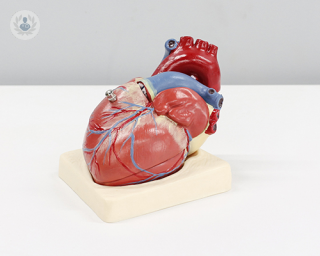

Should atrial fibrillation be treated as soon as possible?
By Dr Saagar Mahida
2025-01-18
In his latest article, Dr Saagar Mahida offers his expert insight into atrial fibrillation. See more
Experts in Atrial fibrillation ablation
-
Professor Mark Gallagher
CardiologyExpert in:
- Atrial fibrillation ablation
- Arrhythmia
- Cardiac resynchronisation therapy
- Defibrillator
- Cardiovascular disease
- Cardiac arrest
-
Mr Franco Ciulli
Cardiothoracic surgeryExpert in:
- Mitral valve repair (minimally invasive)
- Coronary bypass surgery
- Atrial fibrillation ablation
- Mitral valve repair
- Beating heart coronary heart bypass surgery (minimally invasive)
- Aortic valve replacement (minimally invasive)
-
Dr Senthil Kirubakaran
CardiologyExpert in:
- Atrial Fibrillation
- Supraventricular tachycardia
- Atrial fibrillation ablation
- Palpitations
- Cardiac (catheter) ablation
- Arrhythmia
-
Dr Anita Arya
CardiologyExpert in:
- Sports cardiology
- Pacemaker
- Atrial fibrillation ablation
- Cryoablation
- Cardiac (catheter) ablation
- Supraventricular tachycardia
-
Dr Jack McCready
CardiologyExpert in:
- Atrial Fibrillation
- Atrial fibrillation ablation
- Arrhythmia
- Pacemaker
- Cardiac (catheter) ablation
- Implantable cardioverter defibrillator (ICD)
- See all

The Runnymede Hospital - part of Circle Health Group
The Runnymede Hospital - part of Circle Health Group
Guildford Street, Ottershaw, Lyne, Chertsey KT16 0RQ
No existe teléfono en el centro.
By using the telephone number provided by TOP DOCTORS, you automatically agree to let us use your phone number for statistical and commercial purposes. For further information, read our Privacy Policy
Top Doctors

London Heart Practice (HCA)
London Heart Practice (HCA)
78 Harley St, London W1G 7HJ, United Kingdom
No existe teléfono en el centro.
By using the telephone number provided by TOP DOCTORS, you automatically agree to let us use your phone number for statistical and commercial purposes. For further information, read our Privacy Policy
Top Doctors

London Bridge Hospital - part of HCA Healthcare
London Bridge Hospital - part of HCA Healthcare
27 Tooley St
No existe teléfono en el centro.
By using the telephone number provided by TOP DOCTORS, you automatically agree to let us use your phone number for statistical and commercial purposes. For further information, read our Privacy Policy
Top Doctors
-
The Runnymede Hospital - part of Circle Health Group
Guildford Street, Ottershaw, Lyne, Chertsey KT16 0RQ, ChertseyExpert in:
- Cardiology
- Hand surgery
- General Surgery
- Maxillofacial Surgery
- Oral surgery
- Orthopaedic surgery
-
London Heart Practice (HCA)
78 Harley St, London W1G 7HJ, United Kingdom, Central LondonExpert in:
- Cardiology
- Preventive cardiology
- Chest pain
- Cardiovascular disease
- Palpitations
- Coronary CT
-
London Bridge Hospital - part of HCA Healthcare
27 Tooley St, Central LondonExpert in:
- 24-hour service
- Cardiology
- Minimal access surgery (keyhole surgery)
- Orthopaedic surgery
- Cardiovascular disease
- Gastroenterology
- See all
- Most viewed diseases, medical tests, and treatments
- Electrophysiology study
- Genetic testing
- Minimal access surgery (keyhole surgery)
- Aortic aneurysms
- Anxiety
- Long Covid
- Medicolegal
- Robotic surgery
- Hypertension (high blood pressure)
- MRI
